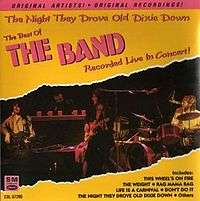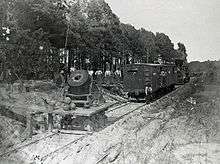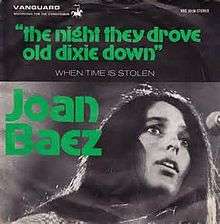The Night They Drove Old Dixie Down
"The Night They Drove Old Dixie Down" is a song written by Robbie Robertson and originally recorded by the Canadian-American roots rock group The Band in 1969 and released on their eponymous second album. Levon Helm provided the lead vocals. The song is a first-person narrative relating the economic and social distress experienced by the protagonist, a poor white Southerner, during the last year of the American Civil War, when George Stoneman was raiding southwest Virginia. The song appeared at number 245 on Rolling Stone magazine's list of the 500 greatest songs of all time.
| "The Night They Drove Old Dixie Down" | |
|---|---|
| Single by The Band | |
| from the album The Band | |
| A-side | "Up on Cripple Creek" |
| Released | September 22, 1969 |
| Recorded | 1969 |
| Genre | |
| Length | 3:33 |
| Label | Capitol |
| Songwriter(s) | Robbie Robertson |
| Producer(s) | John Simon |

Joan Baez recorded a version of the song that became a top-five chart hit in late 1971.
Creation and recordings
The song was written by Robbie Robertson, who spent about eight months working on it.[1] Robertson said he had the music to the song in his head and would play the chords over and over on the piano but had no idea what the song was to be about. Then the concept came to him and he researched the subject with help from the Band's drummer Levon Helm, a native of Arkansas.[2][1] In his 1993 autobiography, This Wheel's on Fire, Helm wrote, "Robbie and I worked on 'The Night They Drove Old Dixie Down' up in Woodstock. I remember taking him to the library so he could research the history and geography of the era and make General Robert E. Lee come out with all due respect."
The lyrics tell of the last days of the American Civil War, portraying the suffering of the protagonist, Virgil Caine, a poor white Southerner. Dixie is the historical nickname for the states making up the Confederate States of America.[3] The song's opening stanza refers to one of George Stoneman's raids behind Confederate lines attacking the railroads of Danville, Virginia at the end of the Civil War in 1865:
Virgil Caine is the name, and I served on the Danville train
Till Stoneman's cavalry came and tore up the tracks again
In the winter of '65, we were hungry, just barely alive
By May the tenth, Richmond had fell, it's a time I remember, oh so well
"The Night They Drove Old Dixie Down" is considered one of the highlights of The Band, the group's second album, which was released in the fall of 1969.[3] According to Rob Bowman's liner notes to the 2000 reissue of The Band, the album has been viewed as a concept album, with the songs focusing on the peoples, places and traditions associated with an older version of Americana.
The Band frequently performed the song in concert, and it is included on the group's live albums Rock of Ages (1972) and Before the Flood (1974). The song also was included in the Band's Thanksgiving Day concert in 1976 which was the subject of Martin Scorsese's documentary film The Last Waltz. The song also appears on the film's soundtrack album as well as on the group's second box set, A Musical History and their double-disk collection of hits, To Kingdome Come.[4][5]
The last time the song was performed by Helm was in The Last Waltz. Helm refused to play the song afterwards. Although it has long been believed that the reason for Helm's refusal to play the song was a dispute with Robertson over songwriting credits; according to Garth Hudson, the refusal was due to Helm's dislike for Joan Baez's version.[6]
Reception
The song was number 245 on Rolling Stone magazine's list of the 500 greatest songs of all time.[2] Pitchfork Media named it the forty-second best song of the Sixties.[7] The song is included in the Rock and Roll Hall of Fame's "500 Songs that Shaped Rock and Roll"[8] and Time magazine's All-Time 100.[9]
Ralph J. Gleason (in the review in Rolling Stone (U.S. edition only) of October 1969) explains why this song has such an impact on listeners:
Nothing I have read … has brought home the overwhelming human sense of history that this song does. The only thing I can relate it to at all is The Red Badge of Courage. It's a remarkable song, the rhythmic structure, the voice of Levon and the bass line with the drum accents and then the heavy close harmony of Levon, Richard and Rick in the theme, make it seem impossible that this isn't some traditional material handed down from father to son straight from that winter of 1865 to today. It has that ring of truth and the whole aura of authenticity.

Joan Baez version
| "The Night They Drove Old Dixie Down" | ||||
|---|---|---|---|---|
 | ||||
| Single by Joan Baez | ||||
| from the album Blessed Are... | ||||
| B-side | "When Time Is Stolen" | |||
| Released | August 1971 | |||
| Genre | Country Folk | |||
| Length | 3:26 | |||
| Label | Vanguard | |||
| Songwriter(s) | Robbie Robertson | |||
| Producer(s) | Norbert Putnam | |||
| Joan Baez singles chronology | ||||
| ||||
The most successful version of the song was released by Joan Baez in 1971. It peaked at number three on the Billboard Hot 100 chart in the US in October that year and spent five weeks atop the easy listening chart.[11] Billboard ranked it as the No. 20 song for 1971. The version reached number six in the pop charts in the UK in October 1971. The song became a Gold record.
The Baez recording had some changes in the lyrics.[12] Baez later told Rolling Stone's Kurt Loder that she initially learned the song by listening to the recording on the Band's album, and had never seen the printed lyrics at the time she recorded it, and thus sang the lyrics as she had (mis)heard them. In more recent years in her concerts, Baez has performed the song as originally written by Robertson.[13]
Chart performance
Weekly singles charts
| Chart (1971) | Peak position |
|---|---|
| Australia National Top 40 (Go-Set)[14] | 5 |
| Canada RPM Top Singles[15] | 3 |
| Canada RPM Adult Contemporary[16] | 1 |
| Ireland (IRMA)[17] | 8 |
| New Zealand (Listener)[18] | 4 |
| UK Singles Chart[19] | 6 |
| U.S. Billboard Hot 100 | 3 |
| U.S. Billboard Adult Contemporary | 1 |
| U.S. Cashbox Top 100[20] | 3 |
Other versions
Johnny Cash recorded the song on his 1975 album John R. Cash. Old-time musician Jimmy Arnold recorded the song on his album Southern Soul, which was composed of songs associated with the Southern side of the Civil War. A fairly large-scale orchestrated version of the song appears on the 1971 concept album California '99 by Jimmie Haskell, with lead vocal by Jimmy Witherspoon. Others to record versions include Don Rich, Steve Young, John Denver, the Allman Brothers Band, Derek Warfield. the Charlie Daniels Band, Big Country, the Dave Brockie Experience, Vikki Carr, Richie Havens, the Black Crowes, Earl Thomas Conley, the Jerry Garcia Band, Sophie B. Hawkins, Legion of Mary, and the Zac Brown Band have included it on live albums. In 2008, Johnny Logan covered the song on his album, Irishman in America. Glen Hansard (of the Frames and the Swell Season), accompanied by Lisa Hannigan and John Smith, performed the song in July 2012 for The A.V. Club's A.V. Undercover: Summer Break series.[24]
The 1972 song "Am Tag als Conny Kramer starb" ("On the Day That Conny Kramer Died"), which uses the tune of the song, was a number-one hit in West Germany for singer Juliane Werding. The lyrics are about a young man dying because of his drug addiction. In 1986, the German band Die Goldenen Zitronen made a parody version of this song with the title "Am Tag als Thomas Anders starb" ("On the Day That Thomas Anders Died").
Personnel on the Band version
- Levon Helm – lead vocals, drums
- Rick Danko – bass guitar, backing vocals
- Garth Hudson – melodica, slide trumpet
- Richard Manuel – piano, backing vocals
- Robbie Robertson – acoustic/electric guitar, backing vocals
See also
- List of anti-war songs
- List of number-one adult contemporary singles of 1971 (U.S.)
References
- Hoskyns, Barney (1993). Across the Great Divide: The Band and America. Hyperion. p. 175. ISBN 1-56282-836-3.
- "The Night They Drove Old Dixie Down". Rolling Stone. Archived from the original on June 21, 2008. Retrieved November 9, 2010.
- Ankeny, Jason. "The Band: The Night They Drove Old Dixie Down". allmusic.com. AllMusic. Retrieved September 2, 2019.
- Marcus, Greil (October 19, 2010). Bob Dylan by Greil Marcus: Writings 1968-2010. PublicAffairs. pp. 73. ISBN 9781586489199. Retrieved July 4, 2015.
- Erlewine, Stephen Thomas. "The Band: A Musical History". allmusic.com. AllMusic. Retrieved September 2, 2019.
- Margolis, Lynne (August 30, 2012). "No False Bones: The Legacy of Levon Helm". American Songwriter. Retrieved March 2, 2016.
- "The 200 Greatest Songs of the 1960s: Part Four: #60-21", Pitchfork Media, August 17, 2006
- "500 Songs That Shaped Rock". Infoplease.com. Retrieved November 6, 2011.
- Cruz, Gilbert (October 24, 2011). "100 Greatest Popular Songs: TIME List of Best Music". Time. Retrieved November 6, 2011.
- Bailey, Frankie Y.; Green, Alice P. (2011). Wicked Danville: Liquor and Lawlessness in a Southside Virginia City. The History Press. pp. 103–. ISBN 9781609490379. Retrieved July 4, 2015.
- The Billboard Book of Top 40 Hits, 6th Edition, 1996 p. 43
- The Last Waltz of The Band Neil Minturn - 2005- Page 85 "be more familiar to some in Joan Baez's version. Hoskyns remarks of Baez's version: "Two years later, Joan Baez recorded a terrible version of 'Dixie' that seemed to turn Robert E. Lee into a steamboat, but it made"
- Kurt Loder (April 14, 1983). "Joan Baez: The Rolling Stone Interview". Rolling Stone. No. 393.
- "Go-Set National Top 40". December 4, 1971. Retrieved February 11, 2016.
- "RPM Singles - Top Hits of '71". Collectionscanada.gc.ca. Archived from the original on March 4, 2016. Retrieved March 2, 2016.
- "Item Display - RPM - Library and Archives Canada". Collectionscanada.gc.ca. October 9, 1971. Retrieved March 19, 2018.
- "The Irish Charts – Search Results – The Night They Drove Old Dixie Down". Irish Singles Chart. Retrieved March 27, 2018.
- "flavour of new zealand - search listener". Flavourofnz.co.nz. Retrieved October 4, 2016.
- "JOAN BAEZ - full Official Chart History - Official Charts Company". www.officialcharts.com.
- "Cash Box Top 100 10/02/71". cashboxmagazine.com. October 2, 1971. Retrieved March 2, 2016.
- "Item Display - RPM - Library and Archives Canada". Collectionscanada.gc.ca. Retrieved March 2, 2016.
- "Top 100 Hits of 1971/Top 100 Songs of 1971". Musicoutfitters.com. Retrieved March 2, 2016.
- "Cash Box YE Pop Singles - 1971". cashboxmagazine.com. December 25, 1971. Retrieved March 2, 2016.
- "Glen Hansard, Lisa Hannigan & John Smith cover The Band". Retrieved April 6, 2013.